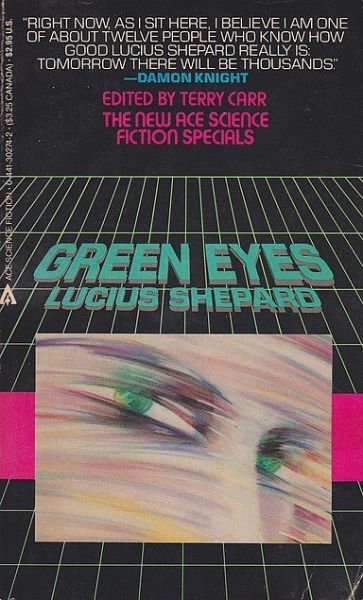Sparks Fly
Green Eyes
By Lucius Shepard

10 May, 2022
Lucius Shepard’s 1984 Green Eyes is a stand-alone science fiction novel. It was the second book to be released in Terry Carr’s Third Ace Science Fiction Specials series.
Thanks to the scientific miracle of a bacterium retrieved from Louisiana gravesites, the dead can be restored to life. New processes always have a catch. In this case, there are two problems: revivification is temporary and the minds that manifest in the former corpses are not the minds those bodies once hosted. In many cases, the new inhabitants are far more brilliant than their predecessors, which makes them a valuable resource.
Jocundra Verret is a therapist whose task it is to guide the zombies to productive use of their brief lives. Unfortunately for her employers, she will go very seriously off-mission.
Steven Meres died a drunk at twenty-nine and rose as Donnell Harrison, talented poet. Donnell was one of the lucky “slow burners”; he might remain active for months before the inevitable side-effects of the bacteria in his body sent him back to the grave. A poet may not be as immediately useful as the zombie who gave the world a cure for muscular dystrophy … but still, keeping the poet mobile justified assigning Jocundra to Donnell.
A fellow zombie sacrifices his life as a distraction so that certain useful information can be conveyed to Donnell in secret, without the scientists running the zombie program being aware of it. Donnell becomes convinced that there may be a way to extend his life beyond the months a slow burner can expect. Step one: escape from researchers who see him only as a useful resource.
Researchers make inept jailors, particularly when the would-be escapee has one of the researchers assisting him. Donnell and Jocundra’s exit from the secret facility is easy enough. Now all that remains is to discover the method by which Donnell’s existence can be extended.
While the bacterium may be new to scientists, it is not new to the world. Others have encountered it before. The scientists explored the phenomenon with familiar methods and many preconceptions. But there are other, and older, ways of thought1. Jocundra and Donnell venture into Louisiana’s world of cult religions and occult factions…
~oOo~
As I recall, this was intended to be the first book in the Ace Specials series. That didn’t work out, so The Wild Shore got that debut spot. Just as well, because The Wild Shore is a much better novel (IMHO).
Usually when I write a review, I learn or rediscover something valuable. What I learned from Green Eyes, was that I had completely misremembered Shepard’s early career. For some reason I thought he was well established as a short fiction author by the time Green Eyes was published. Not so! His first short story, “The Taylorsville Reconstruction,” appeared only eleven months before Green Eyes. Given publishing lead times, you might wonder, therefore, how Shepard came so immediately to Carr’s attention as a potential novelist. “The Taylorsville Reconstruction” appeared in Universe 13, edited by none other than Terry Carr himself. Carr knew more about Shepard’s talents than other editors would have known.
Pro: the novel is atmospheric as all get-out and it gets full milage out of its Louisiana setting. As well, the novel takes an interestingly neutral stance on the zombification process: it’s a natural phenomenon and what people make of it really depends on the people involved, not any inherent goodness or badness of revivication. As well, Shepard’s prose is entertaining (if somewhat florid).
Con: I hadn’t remembered much about the book beyond “beautiful researcher something something something Louisiana zombies.” Upon re-reading, I realized why my memories were so scanty: the novel is rather unfocused. The plot meanders in a manner that suggests perhaps it would have been better for Shepard to have tackled this as a series of short stories or novellas.
That said, other people seem to have liked this book more than I did.
- The juried Campbell Memorial Award for Best Science Fiction Novel gave Green Eyes second place (it lost to Pohl’s The Years of the City).
- Green Eyes came in 21st in the Locus Best Novel Category (it lost to The Integral Trees [dire book that it is] and nineteen other books as well).
- It was fourth in the Locus Best First Novel competition (lost to The Wild Shore2).
- It was a finalist for the Philip K. Dick Award (losing to Neuromancer).
- It was also a finalist for the Clarke Award (lost to The Handmaid’s Tale).
Shepard went on to have a long and well-regarded career. Indeed, his 2013 death hasn’t stopped new Shepard works from appearing as recently as 2022, an example other authors would do well to emulate.
Green Eyes is available here (Amazon UK). I did not find it at Amazon US, Amazon Canada, Barnes & Noble, Book Depository, or Chapters-Indigo. In general, Shepard appears to be almost entirely out of print in North America or if he is in print, major booksellers are unaware of the fact.
1: To quote William Gibson’s Burning Chrome, “The street finds its own uses for things.”
2: Looking at the list of Locus Best First Novel nominees for 1985 reminded me of the way Orbits 6 and 7’s dominated various awards.
Of the seventeen works nominated for Locus Best First Novel in 1985, five came from the Third Ace Science Fiction Specials series. Coincidentally, five is also the total number of Ace Science Fiction Special novels published in 1984, the relevant year for the 1985 Locus Best First Novel Award. Every Third Ace Science Fiction Special novel that could have been nominated was nominated.
